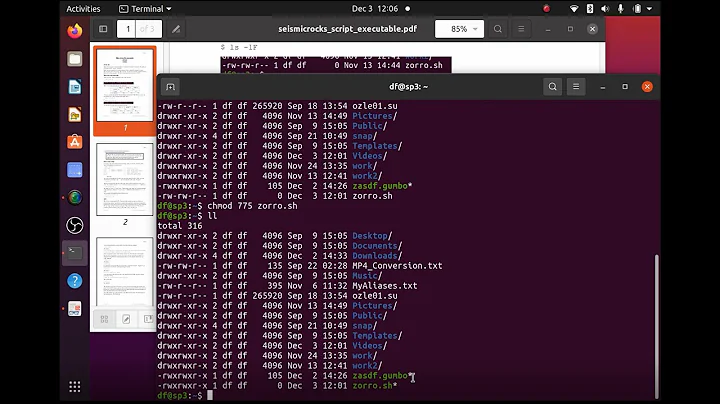How can I find only the executable files under a certain directory in Linux?
Solution 1
Checking for executable files can be done with -perm (not recommended) or -executable (recommended, as it takes ACL into account). To use the -executable option:
find <dir> -executable
if you want to find only executable files and not searchable directories, combine with -type f:
find <dir> -executable -type f
Solution 2
Use the find's -perm option. This will find files in the current directory that are either executable by their owner, by group members or by others:
find . -perm /u=x,g=x,o=x
Edit:
I just found another option that is present at least in GNU find 4.4.0:
find . -executable
This should work even better because ACLs are also considered.
Solution 3
I know the question specifically mentions Linux, but since it's the first result on Google, I just wanted to add the answer I was looking for (for example if you are - like me at the moment - forced by your employer to use a non GNU/Linux system).
Tested on macOS 10.12.5
find . -perm +111 -type f
Solution 4
I have another approach, in case what you really want is just to do something with executable files--and not necessarily to actually force find to filter itself:
for i in `find -type f`; do [ -x $i ] && echo "$i is executable"; done
I prefer this because it doesn't rely on -executable which is platform specific; and it doesn't rely on -perm which is a bit arcane, a bit platform specific, and as written above requires the file to be executable for everyone (not just you).
The -type f is important because in *nix directories have to be executable to be traversable, and the more of the query is in the find command, the more memory efficient your command will be.
Anyhow, just offering another approach, since *nix is the land of a billion approaches.
Solution 5
A file marked executable need not be a executable or loadable file or object.
Here is what I use:
find ./ -type f -name "*" -not -name "*.o" -exec sh -c '
case "$(head -n 1 "$1")" in
?ELF*) exit 0;;
MZ*) exit 0;;
#!*/ocamlrun*)exit0;;
esac
exit 1
' sh {} \; -print
Related videos on Youtube
HaiYuan Zhang
Updated on September 17, 2022Comments
-
HaiYuan Zhang over 1 year
How can I find only the executable files under a certain directory in Linux?
-
AjayKumarBasuthkar about 10 yearsHere is a kind of BASH script, it is not-bad is what I can say :) stackoverflow.com/a/20209457/2067125
-
Breakthrough over 9 yearsWhat about using the standard
filecommand? -
 techfoobar over 9 yearsFor anyone wanting to do this on a Mac (tested on OS X 10.9.5):
techfoobar over 9 yearsFor anyone wanting to do this on a Mac (tested on OS X 10.9.5):ls -l | egrep '^[^d]..x..x..x.*$'The above will list all executables (for all/user and group) in the current directory. Note: The-executableoption does not work on a Mac hence the above workaround. -
Slothworks over 8 yearsAlso relevant: Unix find: search for executable files
-
 G-Man Says 'Reinstate Monica' about 8 years@techfoobar: The question is ambiguous: Does it mean files that contain executable code, or does it mean files that have executable permission? But even if we assume that executable permission is what is wanted (as the majority of the responses seem to), the question doesn't say world-executable. Your solution will find files (and also fifos, sockets, symlinks, etc.) that have world execute permission, but not 750 (
G-Man Says 'Reinstate Monica' about 8 years@techfoobar: The question is ambiguous: Does it mean files that contain executable code, or does it mean files that have executable permission? But even if we assume that executable permission is what is wanted (as the majority of the responses seem to), the question doesn't say world-executable. Your solution will find files (and also fifos, sockets, symlinks, etc.) that have world execute permission, but not 750 (-rwxr-x---), which is still executable to some users.
-
-
Ben over 14 yearsThis will return files with the execute turned on only. A more thorough analysis would check for a shebang line or whether the file is binary
-
nerkn over 14 yearsa shebang doesn’t mean they’re executable. it tells us only which interpreter to use. and by linux definition “executable files” are files with the executable (x) bit set
-
innaM over 14 yearsWhat version of find supports that type for -type? man find lists b, c, d, p, f, l, s and D on my system.
-
davr over 14 yearsSame here, my find doesn't have a
-type xeither. -
davr over 14 yearsThis only works on a newer version of find. The one that comes by default with CentOS gives the error
find: invalid mode/u=x,g=x,o=x'` -
innaM over 14 yearsThen you should try the "-perm +" version which is now deprecated in GNU find: find . -perm +111"
-
Garik over 14 yearsFor some reason I always think that "-type x" will work too. I can only imagine it was available on some flavour of Unix I used once.
-
nerkn over 14 years@dave: glad to hear i’m not the only one :)
-
karthik almost 14 yearsIf you have an old version of find (probably before 4.3.8) which lacks -executable use find . -perm /u=x,g=x,o=x.
-
Good Person over 11 years-executable isn't at all portable and should be avoided
-
SSH This almost 11 years
find: invalid predicate -executable'on RHEL -
DerMike over 9 yearsWhat does this do?
-
AjayKumarBasuthkar over 9 years@DerMike, It is one of the ways to find executable in current directory, including .so files, even if a file is not marked executable it can discover.
-
DerMike over 9 yearsWell, I mean, how does it do that?
-
AjayKumarBasuthkar over 9 yearsIt reads from the header of the file to discover, every binary file or script file has header.
-
 G-Man Says 'Reinstate Monica' about 8 yearsAs far as I know,
G-Man Says 'Reinstate Monica' about 8 yearsAs far as I know,-name "*"has no effect onfind— it normally finds all files that are not eliminated by tests. -
 Scott - Слава Україні about 8 yearsSeems like
Scott - Слава Україні about 8 yearsSeems like-perm /111may be the most portable version. -
 Scott - Слава Україні about 8 years(0) Which do you prefer, arcane and correct or intuitive and flawed? I prefer correct. (1) innaM’s answer, featuring
Scott - Слава Україні about 8 years(0) Which do you prefer, arcane and correct or intuitive and flawed? I prefer correct. (1) innaM’s answer, featuringfind -perm, finds files that have any execute permission bit set. (2) By contrast, this answer finds only files for which the current user has execute permission. Granted, that might be what the OP wants, but it’s unclear. … (Cont’d) -
 Scott - Слава Україні about 8 years(Cont’d) … (3) For clarity, you might want to change
Scott - Слава Україні about 8 years(Cont’d) … (3) For clarity, you might want to change`…`to$(…)— see this, this, and this. (4) But don’t dofor i in $(find …); do …; it fails on filenames that contain space(s). Instead, dofind … -exec …. (5) And, when you do work with shell variables, always quote them (in double quotes) unless you have a good reason not to, and you’re sure you know what you’re doing. -
Mark McKenna about 8 years@scott OK, I stand corrected :) I read the
-permargument as requiring all three, not one of them. Also, thank you for the input on protecting shell arguments, that's all stuff I wasn't aware of. -
 nonchip over 7 years@AjayKumarBasuthkar you are aware this is NOT an answer to the question? the question was how to find executable files (=those that can be executed, = those w/ +x). not how to find all ELF, EXE and whatever-ocamlrun-is files.
nonchip over 7 years@AjayKumarBasuthkar you are aware this is NOT an answer to the question? the question was how to find executable files (=those that can be executed, = those w/ +x). not how to find all ELF, EXE and whatever-ocamlrun-is files. -
Devy over 7 years@MarkMcKenna you have a typo in there:
for i infind . -type f; do [ -x $i ] && echo "$i is executable"; done; you are missing the <dir> part, which I use a dot(.) -
 xenoid almost 7 yearsThat won't work if the script contains non-ASCII characters.
xenoid almost 7 yearsThat won't work if the script contains non-ASCII characters.filereports the encoding, so a python script can be reported asa /usr/bin/python script, UTF-8 Unicode text executable.find ... | xargs file -b | grep -v '^ELF'could work better to spot the non-binaries. -
José Tomás Tocino almost 6 yearsWorks in RHEL 5 too.
-
 Oliver over 5 yearsThis is the only variant I could get working on OS X 10.14, thx
Oliver over 5 yearsThis is the only variant I could get working on OS X 10.14, thx -
Dan Bolser about 5 yearsHow about not executable? Seems like a good thing to add here...
-
nerkn about 5 years@DanBolser that's as simple as
find -not -executable(optionally with-type f, depending on whether you want to only include files in the result) -
Dan Bolser about 5 yearsThanks @knittl, worth editing the answer?
-
nerkn about 5 years@DanBolser the discussion probably takes longer than actually updating the answer, but I think the answer is complete as it stands now. The OP was specfically about finding files which are executable, not about excluding them. I expect people to read the find man page to some extent and they will find the basic
-notoperator there. -
Dan Bolser about 5 yearsI can't edit it. I've been using find for years, but -executeable and -not are both new to me (just saying ;-)
-
jmcarter9t over 4 yearsNeeded this while using a busybox build of find. -executable did not work.
-perm +111is perfect. -
Torque about 4 years@nonchip I strongly disagree. @OP did not ask what files were set to executable/+x, but what files were actually executable. The definition of what that means is left to the reader, but I would not consider
portrait.pngexecutable, even witha+x, and I would consider/usr/bin/grepan executable, even if it was accidentally changed to miss thexflag. -
 nonchip about 4 years@Torque but
nonchip about 4 years@Torque butportrait.pngcan be executable by your logic, just get a Piet interpreter. and even if then executable means "can be run with./" (which requiresx) just configurebinfmt_misc. also pretty sure the grammar "only the executable files" implies "only the files which are executable", not files that are of the few (of the many executable formats out there) you deemed worthy. that would be "only ELF files", "only programs" or similar. and you didn't find.app,.py,.lua,.sh, all executables (even usually with./from bash), unlike.soand.dll. -
AjayKumarBasuthkar about 4 yearsThose down voting the answer with or without verifying the functioning of the script, reflects their ability to reason, discover usefulness &/ learn, acknowledge our peers, knowledge & maturity.
-
bballdave025 about 4 yearsThis is the solution I will be using. Very time-efficient, and I like being able to put it in
~/.bashrc. -
 Jeff about 3 years@Scott
Jeff about 3 years@Scottfind -execseems to fail if what I want to do issourcethe found file, so I'm usingfor... do... -
 Scott - Слава Україні about 3 years@bballdave025: That’s a red herring; all the answers could be put into
Scott - Слава Україні about 3 years@bballdave025: That’s a red herring; all the answers could be put into.bashrcif you wanted to. -
 G-Man Says 'Reinstate Monica' about 3 yearsThe downvotes you’ve gotten so far reflect the belief that you’re answering the wrong question with a skimpy explanation. I wonder why you consider
G-Man Says 'Reinstate Monica' about 3 yearsThe downvotes you’ve gotten so far reflect the belief that you’re answering the wrong question with a skimpy explanation. I wonder why you consider.sofiles to be executable but not.ofiles, and why you consider OCaml scripts to be executable but not shell scripts (or Awk, Perl, Python, etc.). Also, your answer has a typo. But THIS downvote is for the snarky, abusive comment. -
bballdave025 about 3 yearsGood point, @Scott , and one that shows that my comment is inaccurate. Thanks for pointing it out, so that others will know. Even so, because of the time-efficiency of this process, I choose to put this one in
~/.bashrc, rather than the others. -
 Admin almost 2 yearsfrom the man page
Admin almost 2 yearsfrom the man page-perm +mode This is no longer supported (and has been deprecated since 2005). Use -perm /mode instead.




